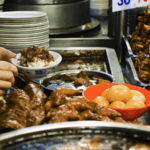By day, Cixi – a manufacturing powerhouse on the Chinese mainland's eastern coast – fuels global supply chains with its small appliance factories. But as dusk falls, the city sheds its industrial cloak to reveal a sizzling nocturnal identity: steaming woks, charcoal grills, and crowds savoring affordable delicacies under neon lights.
In a recent exploration, CGTN host Sergey Gordeev navigated this culinary underworld on a 50-yuan ($7) budget, sampling grilled oysters bursting with garlic aroma, golden-fried dumplings, and even adventurous skewers of scorpion. 'This isn't just dinner; it's theater,' he remarked, watching chefs flip scallops on iron griddles as office workers unwind over shared plates.
The phenomenon reflects China's thriving 'night economy,' valued at over 40 trillion yuan ($5.6 trillion) in 2023. For business analysts, Cixi's dual identity offers insights into regional economic diversification. Cultural researchers note how these markets preserve culinary traditions while embracing modern tastes – like cheese-topped squid appealing to younger crowds.
For travelers, the experience delivers authentic local flavor without luxury price tags. A dozen plump oysters cost just 15 yuan ($2), while sweet potato noodles simmered in bone broth go for 8 yuan ($1.10). As midnight approaches, the scene thrives – a testament to both enduring food culture and the spending power of China's rising middle class.
Reference(s):
cgtn.com








